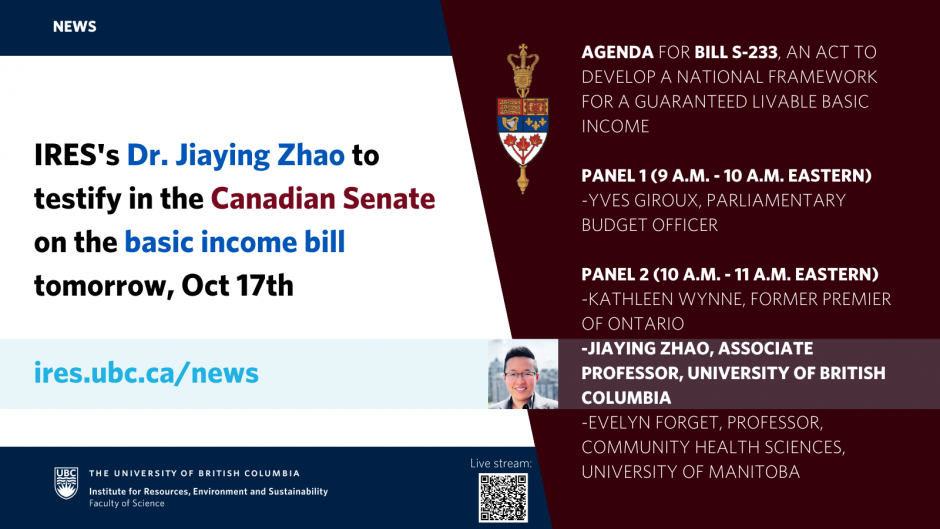Zhao (she/her), UBC Associate Professor in Psychology and IRES, will serve as an expert witness supporting Bill S-233, an Act to develop a national framework for a guaranteed livable basic income. All are welcome to view the livestream at 7am Pacific/10am Eastern.
Update: Zhao’s testimony is now available to watch.
Bill S-233, if passed, would establish the first national framework for an unconditional Guaranteed Livable Basic Income for all persons over 17 across Canada. Tomorrow, on the International Day for the Eradication of Poverty, the Senate will study livable basic income with supporters hoping to send it to the House of Commons. The bill is introduced in coordination with C-223, a similar effort from within the House.
The framework would mostly benefit Canadians who are below the poverty line – currently 7.4% of the Canadian population. Two provincial programs have already established precedence for basic income; first, in 1974 in Manitoba and second, in 2017 in Ontario. Although the latter ended prematurely, participants in both programs showed improvements in their physical health and mental wellbeing. Zhao, who studies the psychological impacts of poverty and homelessness, will offer her expertise during the Senate hearing.
“In Vancouver, we just saw a whopping 32% increase in homelessness from 2020 to 2023, which is disproportionate because the Vancouver population only increased by 3%,” Zhao said.
Her work studying cash transfers to those experiencing homelessness showed that cash transfers produced net savings for society because recipients relied less on social services. While basic income is a form of direct cash transfer, Zhao said that the evidence shows that basic income programs can benefit both individuals and society.
“I feel honored to have the opportunity to present in the Senate,” Zhao said. “As a scientist, I’m excited to present evidence from my work on the psychological impacts of poverty, as well as cash transfer approaches to alleviate poverty, to inform public policy. A basic income policy provides income security to the marginalized individuals in our country. It’s much needed right now when many people are struggling with inflation and rising living costs.”
After the Senate meeting, she will participate in a press conference with fellow panelists. Zhao’s findings and recommendations can also be found in her new book: Cash Transfers for Inclusive Societies: A Behavioral Lens. The book provides an understanding of how behavioral science can better inform the design, delivery, and evaluation of cash transfer programs. “Governments, practitioners, and society in general should design cash transfer programs to improve inclusivity and equality, and reduce poverty,” said Zhao.
Check out the links below for more information!
Resources:
- Media contact: communications@ires.ubc.ca
- Live streamed link for the Standing Senate Committee on National Finance. Zhao will present at 7am Pacific/10am Eastern: https://senparlvu.parl.gc.ca/XRender/en/PowerBrowser/PowerBrowserV2?fk=616117&globalStreamId=3
- Agenda for the Standing Senate Committee on National Finance: https://sencanada.ca/en/Committees/NFFN/NoticeOfMeeting/616117/44-1
- Bill S-233: https://www.parl.ca/DocumentViewer/en/44-1/bill/S-233/first-reading
- Sign and share the petition telling our Senators to support Bill S-233 and send it to the House! https://www.ubiworks.ca/guaranteed-livable-basic-income
- Book: Cash Transfers for Inclusive Societies: A Behavioral Lens
- Edited by Jiaying Zhao, Saugato Datta and Dilip Soman
- Expert panel and book launch, Wed, Nov 8, 2023 5:00 PM – 6:00 PM EST, at the U of T: https://utorontopress.com/9781487545178/cash-transfers-for-inclusive-societies/
